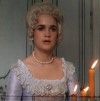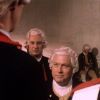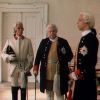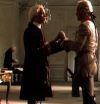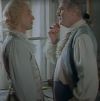By now, enough intriguing contradictory sources have turned up on the matter of
Christian Friedrich Glasow, hussar, valet and possible spy/wannabe assassin, that it's worth a separate post collecting them all.
( Lehndorff: This Glasow must die! )Then there's
Alexander von Münchow, who was of interest to us mainly due to his
controversial testimony regarding Katte's execution which he may or may not have witnessed as a child when his father was a key player at Küstrin, and who served for a while as page to Fritz years later.
( Münchow: With a tea spoon of poison ) Now, neither Lehndorff nor Münchow doubt Glasow was, in fact, guilty of what he's been accused of. Imagine, therefore, my intrigued surprise when I read the memoirs of Friedrich Adolf von Kalckreuth, as dictated to his son, translated into German (Kalckreuth had dictated in French), and printed also in Minerva (clearly the magazine for 19th century history lovers), and they turned out to contain a passionate defense of Glasow.
Credibility of witness: Kalckreuth met Heinrich shortly before the war, became his AD and favourite from 1758 onwards, and remained his favourite until he was ousted by Kaphengst in the mid 1760s. His last attempt to hold to his position involved making a pass at Heinrich's unfortunate wife. He then ended up in a couple of deadbeat assignments in the provinces (where Lehndorff reencounters him in the 1770s and can't help indulging in some Schadenfreude, more
here), until Fritz dies and nephew FW2 gets on the throne, which is when Kalckreuth resumes his career and makes it to Field Marshal in the Napoleonic wars. Being dumped by Heinrich in favour of Kaphengst left him with an ongoing grudge and the tendency to claim that all of Heinrich's military success during the Seven-Years-War was really due to him, which historians have taken less than seriously (especially given that Kalckreuth hadn't been with Heinrich in the early war years and was not always present during the later events). However: whether or not Glasow was guilty is absolutely immaterial to Kalckreuth's reputation, he has no horse riding on this, and he was, though not as Heinrich's AD, present in the Dresden winter quarters of 1756/1757, and so it's absolutely worth noting that he thinks Glasow was completely innocent. Here's what Kalckreuth, in old age - just like Münchow - dictated to his son:
( Kalckreuth: Glasow was framed! )Now, this version by itself is actually quite plausible. Anyone rising quickly in royal favour, which Glasow undoubtedly did, is bound to evoke jealousy and resentment among the rest of the staff. And if favourite sister Wihelmine having lunch with Maria Theresia in the last phase of the previous war caused spectacular royal displeasure in her brother, then a mere valet hanging out with the wife of Saxony's PM (whom Fritz despised and presented in the blackest colours in his later history of the 7 Years War) was bound to suffer severe consequences.
However, as stated before: Kalckreuth writes this decades after the fact. Turns out there's yet another source noting down the Glasow scandal, this one, like Lehndorff, right when it happened, but, unlike Lehndorff, not from far away Berlin but during the events itself in Dresden. It's none other than Kalckreuth's predecessor as Heinrich's AD, Victor Amadeus Henckel Graf von Donnersmarck. (If anyone reading this is a fan of the Oscar winning movie
The Lives of Others, directed by Florian Henckel von Donnersmarck, yes, same family.) Credibility of witness: Henckel von Donnersmarck's war time diary from 1756 - 1758 is regarded an an important source on the early part of the 7 Years War. He's relentlessly critical of Frederick the Great, which earlier historians - to whom any criticism of the great national hero was suspect - blamed on his connection to Heinrich, but I haven't seen anyone calling him a liar for it. (Just prejudiced.) Henckel von Donnersmarck resented Kalckreuth which is why he ended up asking for a transfer once Kalckreuth also became Heinrich's AD. However, Henckel's (friendly - no biographer has described them as romantic) relationship with Heinrich survived this, and the war. When he died, Heinrich assumed responsibility for his widow and son. His grandson's memoirs are responsible for a couple of anecdotes about Heinrich in his last years of life, and Henckel himself is one of the 29 men honored by Heinrich on the Rheinsberg Obelisk.)
This same Victor Amadeus Henckel von Donnersmarck believes Glasow to be guilty as sin when noting down the sensational news:
( Henckel: Glasow did it! He only had himself to blame! )So: what do we believe?
( The Salon debates )![[personal profile]](https://www.dreamwidth.org/img/silk/identity/user.png) gambitten
gambitten added another key bit of evidence, directly from the Secret Prussian State Archive,
here:
( Glasow: A Most Wanted Man )Yet another take on the Glasow affair is offered by Friedrich Nicolai in his six volume collection of Frederician anecdotes, "Anekdoten von König Friedrich II. von Preußen, und von einigen Personen, die um ihn waren", which got published between 1788 and 1792:
( Glasow: A seduced youth corrupted by a ruthless coffee maker )This ends the Nicolai version of the tale of Glasow (and Völker). I'll do a separate post on Nicolai one of these days, but suffice to say for the purpose of this matter that he usually names his sources, though not in this particular case, which is interesting. He just says they are "trustworthy". The other pro-Glasow source we have is Kalckreuth, but Kalckreuth blames Glasow's dismissed servant for wrongly accusing him and doesn't say anything about Völker/Wöllner at all, so I don't think Kalkreuth is Nicolai's source. (My other reason for doubting it is that Heinrich doesn't get mentioned once in six volumes of anecdotes, and I think if Nicolai had an in with Heinrich's former
boyfriend AD, there's be some stories at least co-starring him.)
A more likely source is former Chamber Hussar Schöning, about whom more
here, who is the named source of a somewhat similar version of the story as given in the anecdote collection by Anton Friedrich Büsching, "Charakter Friedrichs des zweyten, Königs von Preussen", which was published in 1788, and somewhat elaborated upon in Büsching's later "Zuverlässige Beiträge", which was published in 1790.
The (much briefer) tale of Glasow shows up right after Büsching's account of the tale of suicidal (and kicked) Kammerhussar Deesen, aka the other handsome hussar who committed suicide over Fritz (and since Fredersdorf had been dead for decades, he really can't have been the cause); you'll find the story
here. Which is why Büsching starts with "another" in this version of the Glasow tale:
( Glasow and Völker: both guilty )And then we have Manger in his history of the builders and architects of Potsdam, talking about the various valets and chamber hussars through which Fritz often interacted with said building folk, usually when he was too angry to talk with them directly. Manger joined the Potsdam Baukontor in 1753 in a lowly position; after the 7 Years War, he made Bauinspektor in 1763. So he might actually have known Glasow, at least from afar. His take:
( Guilt proven! Though he looked dashing in red ) As of July 2022, yet another take has come to our attention, through Gustav Volz's essay on the correspondence between August Wilhelm and Lehndorff ("Aus dem Briefwechsel des Prinzen von Preußen August Wilhelm mit dem Kammerherrn Graf Ernst Ahasverus Lehndorf (sic)", published 1905 in the "Masovia" magazine).
( AW: Other than treason and theft, he didn't do anything ) Gentle readers, we leave it up to you to decide whether Glasow was guilty or framed. If you want to know what happened to him: his father petitioned Fritz for his life, with the
the petition in question reading like an eerie deja vu if you're familiar with the petitions Katte's father and grandfather wrote to Friedrich Wilhelm. Unlike his father, Fritz noted on the petition that whille "his son's crime was great, I have mitigated somewhat", and did not go for a death sentence. Glasow regardless died in prison in Spandau within that same year.



